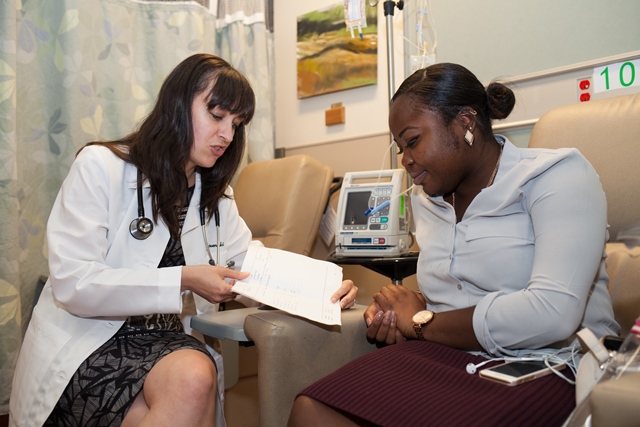
A new “virtual” clinic at St. Michael’s combines treatment and research for patients with thrombotic thrombocytopenic purpura, or TTP, an extremely rare blood disorder.
TTP is an acute disease that causes blood clots in the small blood vessels of the brain, heart and kidneys, which can cause permanent organ damage. TTP patients have low platelet counts and little or no ADAMTS13, a protein that prevents abnormal clotting. The most effective treatment is plasmapheresis, a procedure that removes a patient’s “bad” plasma and replaces it with healthy plasma. Once a patient is in remission, his or her platelet levels must be checked regularly to monitor for possible relapse.
Coordinating follow-up appointments with different physicians, including hematologists and nephrologists, as well as plasmapheresis nurses, can be tricky. In the new clinic, a patient’s visit is tracked with a special code while he or she attends different appointments. He or she is able to keep in touch with the medial team through phone, email or drop-in. The medical team can collect statistics and implement research and quality improvement initiatives.
“It’s extremely important to monitor patients so we can quickly treat them if they relapse,” said Dr. Katerina Pavenski, the head of the Transfusion Medicine division and medical director of the Therapeutic Apheresis Service. “Since many of our patients live far away, we can act as a resource to local specialists and maintain therapeutic relationships with a patient.”
Lesley Asiedu, a TTP patient, said that knowing she will be able to keep in touch with her medical team will be a relief when she returns to school in August.
Asiedu was at school in Curaçao when she began feeling achy, short of breath and chest pain. She was airlifted to a hospital in Miami and diagnosed with TTP. The Brampton native was transferred to St. Michael’s to receive treatment.
“When I was diagnosed with TTP, my platelet level was six when it should have been between 140 and 300,” she said. “I should have had a huge fever and kidney failure. I believe I got through this because of God and I was lucky enough to get the right treatment at St. Michael’s.”
Asiedu was in and out of the hospital for about a month. She said that when she returns to her studies in August, she can get most of her blood work done in Curaçao, but it is a comfort to know she will be able to stay in touch with her care team virtually at St. Michael’s.


